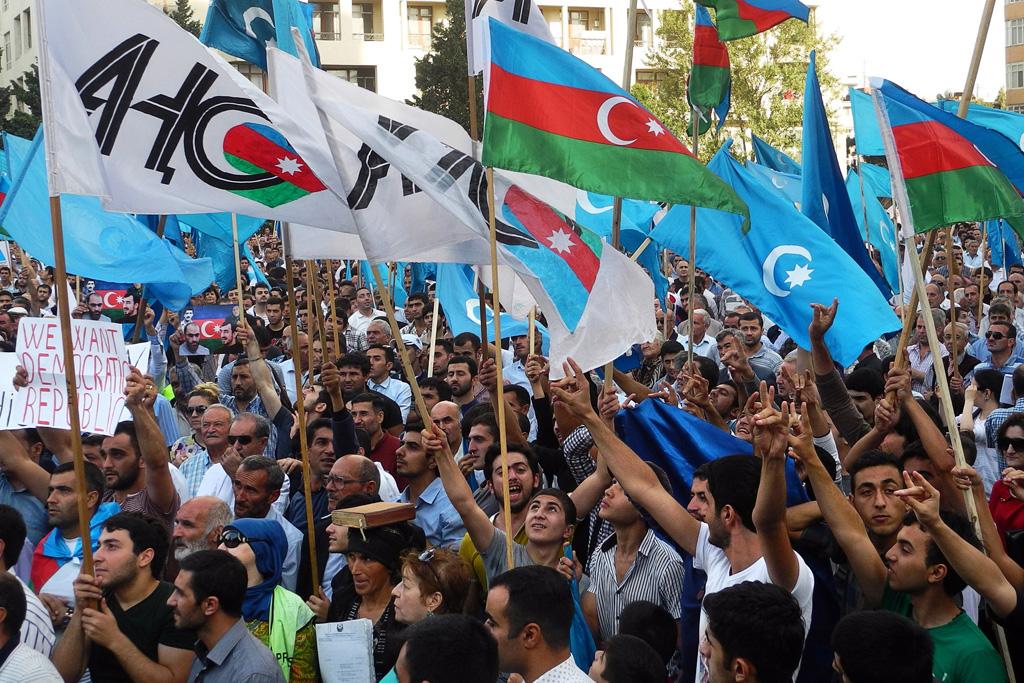Support for oil-rich Azerbaijan is critical to Western interests
Supporters of presidential candidate Jamil Hasanli gather during a rally in Baku on Sept. 22, 2013.
WASHINGTON — There was never any doubt that Azerbaijan’s incumbent president, Ilham Aliyev, would win re-election overwhelmingly, or that some foreign observers would criticize his conduct. But the West would be wrong to withdraw its support from Azerbaijan, if it wants a new regime that would be more favorable to democracy.
President Aliyev's majority of the vote in this month's presidential election, approaching 85 percent, raised eyebrows in the West. But his share of the vote roughly approximates his approval rating.
Moreover, his opposition was weak and more closely tied to Azerbaijan's meddling and menacing neighbors, Russia and Iran, than to any significant base of support within Azerbaijan itself. Aliyev's leading opponent, Camil Hasanli, was the opposition's second choice. Its first, Rustam Ibragimbekov, was disqualified because he holds dual citizenship with Russia and lives in Moscow.
Post-election protests have been relatively small, especially compared with much larger pro-democracy protests in Russia and Iran.
To be sure, there were irregularities in the elections, as some election monitors and observers have reported. Their observations are carried out according to their mandates as independent monitors, who do not attempt to place events in a larger political or geostrategic context. But policymakers need to consider the politics as well as the procedures when evaluating elections.
The larger context reveals that, in many areas, Western and Azerbaijani interests are intertwined. Azerbaijan is an essential ally in a tough neighborhood, working with Western nations on regional stability and energy security. Moreover, its government is secular, a rarity among largely Muslim societies. It accepts Christians and Jews and recognizes equal rights for women.
Azerbaijan is in a pivotal position at the doorway to Europe, Asia and the Middle East. On the Eurasian Corridor, it is a crucial crossroads for the Western allies' supply route to Afghanistan, where it collaborates on countering terrorism, nuclear proliferation and narcotics trafficking.
Existing and planned energy projects in Azerbaijan greatly contribute to the diversification of oil and gas supplies from the Caspian Basin to Europe. This is critical for European energy security.
The Trans-Adriatic Pipeline, with a recently announced extension to Italy, will bring 353 billion cubic feet of Azerbaijani natural gas to Southern Europe every year. Azerbaijan also supplies 40 percent of Israel's oil needs.
These factors make Azerbaijan attractive to Russia and Iran. Both saw the recent elections as an opportunity to exploit the weaknesses of Azerbaijan's political system and meddle in its affairs.
Russian strategy, before and after the election, is similar to its approach in subverting and eventually seducing other governments in former Soviet states, such as Georgia, Belarus, and Ukraine.
First, incite protests against a government. Then, watch and wait while the government overreacts, inspiring excessive criticism from the West. Then, woo the government, now estranged from the West, back into the Russian orbit. As Russia understands so well, if it can manipulate the procedures, it can then mutilate the policies.
The United States and the nations of the European Union should not fall into this trap. Partnership with Azerbaijan need not sacrifice democratic values for pragmatic concerns. Countries seeking to build free societies on the ruins of communism must embed the roots of democracy in national heritage and circumstances. This process cannot be seen as an implant, imposed from outside.
Criticizing Azerbaijan without understanding the larger context will have the unintended consequences of isolating Azerbaijan from free-market democracies.
Estrangement from the West could lead, in turn, to an Azerbaijani affiliation with Russo-centric institutions such as the Customs Union and the Eurasian Union that offers few benefits and has no future.
By engaging with the elected leadership, Western nations can work together to remedy the shortcomings this election revealed and continue the democratic transformation.
Azerbaijan is reaching out to the West, and the West should reach back, for the sake of mutual economic and security interests. This offers the best chance for democracy to take root in a challenging environment.
Temuri Yakobashvili is senior Transatlantic Fellow at the German Marshall Fund of the US and former ambassador of the Republic of Georgia to the United States.
Every day, reporters and producers at The World are hard at work bringing you human-centered news from across the globe. But we can’t do it without you. We need your support to ensure we can continue this work for another year.
Make a gift today, and you’ll help us unlock a matching gift of $67,000!
